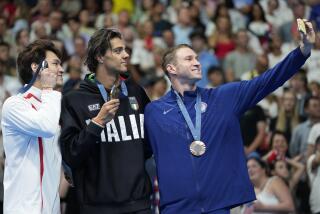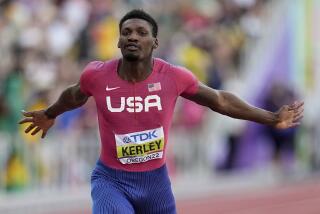SWIMMING : PAN PACIFIC CHAMPIONSHIPS : Meet Ends in Record-Breaking Fashion
- Share via
EDMONTON, Canada — Denied world records by the slightest of margins earlier in the Pan Pacific Championships, American Jeff Rouse and Australian Kieren Perkins came through with world marks in the 100-meter backstroke and the 800 freestyle, respectively, on the last night of competition at the Kinsmen Aquatic Centre.
Rouse led off the last event of the meet, the 400 medley relay, with a 53.93-second backstroke leg, which shattered David Berkoff’s 1988 world record of 54.51. On Thursday, in the individual event, Rouse clocked a 54.67.
“I had no idea I’d go under 54 seconds,” said Rouse who had predicted a world-record before the meet but thought it would be slightly under Berkoff’s mark.
“I really can’t believe it. I had to look twice (at the clock). It was pure elation at that moment.”
Half an hour before Rouse’s swim Perkins electrified the crowd of 800 by breaking the 800 mark en route to winning the 1,500 freestyle.
Forty-eight hours earlier, Perkins missed the mark by four-hundreths of a second.
The 18-year-old from Commerical, Queensland, bettered the second-oldest men’s record, Valdimir Salnikov’s 1986 world mark of 7:50.64, by swimming a 7:47.85, which earned him $12,500 from an Australian cereal company.
Perkins used a hand touch instead of a slip turn to ensure that he had the record, celebrated for a split second and then completed the race in 14:59.79.
It was his third individual gold medal.
Swimming Notes
Summer Sanders of Roseville, Calif., was the other triple event-winner with a triumph in the 200 individual medley, in 2:14.04, the second-fastest time in the world this year. Earlier, she won the 200 butterfly and 400 individual medley. . . . The women’s team got a boost from its 400 medley relay team, which set an American record at 4:05.98, and from Northridge teen-ager Kristine Quance, who clocked the second-fastest time in the 200 breaststroke, a 2:27.55, en route to a gold medal. . . . The United States finished with 51 medals, 26 of them gold. Australia wound up with 30 medals, eight of them gold, and Japan showed great improvement with 12 medals and 22 national records.
More to Read
Go beyond the scoreboard
Get the latest on L.A.'s teams in the daily Sports Report newsletter.
You may occasionally receive promotional content from the Los Angeles Times.






